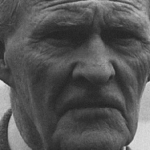These are the streets where we walked with war and childhood
Like our two shadows behind us, or
Before us like one shadow.
river walks
Threaded by park rats, flanked by battleships,
Flickering of a grey tail on the bank,
Motionless hulls
Enormous under a dead grey sky.
Farther, the harbor and the miscolored waters
Rocking their flotsam under the blank round eye
At the masthead staring down the rats to come,
Beyond the fisher gulls.
And the windows full of ropes and hardware,
Doorways, barreled, yawning on the dark,
Wall-eyed alleys, coils of husky smells,
The breath of journeys strong there.
Streets whose sordid beauty
joked readily with hope.
The taller avenues,
And walls that smiled like unpurchased horizons,
Swung intimate views out of a foreign room,
Hung a gate upon a garden's fable,
Walls that frowned
With aged remorseless eyes
Or the gloom of thunderlit landscapes, opening
A door into that placeless country
Too, those halls
Where we stepped lightly among the creatures
Whom death had tamed, who yet crouched, sprang, or flew,
Fierce as hunger, graceful as joy,
Until we knew, as in a half silvered mirror, the half
Captive image of immortality.
These are the old places, and walking there
As then with war and childhood, I look into the shadows' faces.
They appal.
Yet often I will see
(The marvels floating alive upon that stream,
The breathing of delight like purest air)
Another place: that you contrived
Between midnight and morning
In your dream, and in the morning
Took me there.
We greeted it, who could not stay.
But it is there,
Surviving disbelief, surviving even what the malign years prepare.




















Comment form: